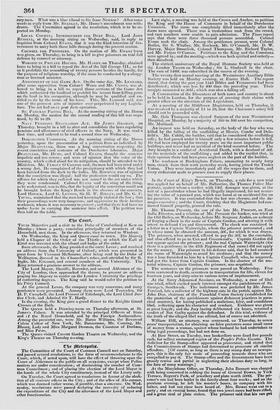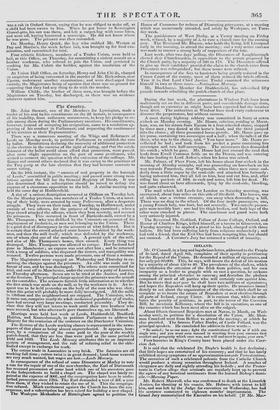In the Court of King's Bench, on Thursday, a rule
for a new trial was applied for on behalf of Mr. Ballantine, the Thames Police Ma- gistrate, against whom a verdict with 130/. damages was given, at the suit of II pawnbroker whom he had illegally imprisoned, for not restor- ing the value of a pawned gun, which was burnt at an accidental fire on his premises. It was contended that the law was obscure, and the da- mages excessive ; and the Court, thinking that the Magistrate had con- ducted himself properly, granted the rule.
Mr. Thomas Prescott, the son of the late Mr. Prescott, an East India Director, and a relation of Mr. Prescott the banker, was tried at the Old Bailey, on Wednesday, before Mr. Sergeant Arabin, on a charge of forging a check in the name of Captain Gordon, and uttering it with intent to defraud Cox and Greenwood. The check was contained in a letter to a Captain Wainwright, whom the prisoner personated ; and in whose name he obtained the amount, 501., for which it was drawn. The prisoner, when arrested, offered to pay the 50/. to the constable, and also offered to go to Cox arid Greenwood's. Captain Gordon did not appear against the prisoner ; and the real Captain Wainwright (for there is a gentleman in the 47th Regiment of that name) did not apply for the money. The prisoner in iris defence said, that he had assumed the name of Wainwright to avoid his creditors; and that the money was a loan furnished to him by a Captain Campbell, who, be supposed, had got the letter front Captain Gordon. In the absence of the ma- terial witness, Captain Gordon, the prisoner, was acquitted.
The sentences on the prisoners were passed on Wednesday. Five were sentenced to death, seventeen to transportation for life, eleven for fourteen years, and sixty-nine to various terms of imprisonment.
At the Sorry Adjourned Sessions, on Wednesday, a case of libel was tried, which excited much interest amongst the parishioners of St. George's, Southwark. The indictment was preferred by Mr. James Percival, late a collector of the highway-rate in the parish, against Mr. John Day, chairman of the Parochial Union Society (established for the protection of the parishioners against dishonest practices in paro- chial matters), for having published a malicious, false, and scandalous libel, reflecting upon his character and conduct. Evidence was given at great length; and the Jury having deliberated six hours, returned a verdict of Not Guilty against the defendant. In this trial, evidence of the truth of the alleged libel was offered, but of course not admitted.
William Hill, an attorney, was sentenced, on Thursday, to seven years' transportation, for obtaining on false pretences some small sums of money from a woman, against whose husband he had undertaken to bring legal proceedings, but bad not done so.
At Bow Street, on Tuesday, two booksellers were fined five pounds each, for selling unstamped copies of the People's Police Gazette. The Solicitor for the Stamp-office appeared as prosecutor, and stated that the Commissioners of Stamps had determined to prosecute all similar offenders. [Of course, as long as there is any stamp. duty on newspa- pers, this is the only fair mode of proceeding towards those who are compelled to pay it. The Stamp-office and the Government have been grossly remiss and partial in neglecting their obvious duty so long, in the face of many warnings.] At the Marylebone Office, on Thursday, John Bennett was charged with being concerned in robbing the house of General Bowes, in York Terrace, Regent's Park, of jewellery and plate worth 50001. The pri- soner's son had been butler in the family about four weeks ; and on the previous evening, he left his master's house, in company with his father, and had not since been heard of. Mrs. Bowes went out to a party ; and on coming home, found that two jewel-cases had been rifled, and a great deal of plate stolen. The prisoner said that his son got
nto a cab in Oxford Street, saying that he was obliged to make off, as -a child had been sworn to him. When he got home to Kensington Gravel-pits, his son was there, and left a carpet-bag with some linen, -and went off, having borrowed a sovereign. He did not know where he was gone. The prisoner was then remanded.
On Monday, Henry Quick, the boy who stabbed Mr. Weston at Day and Martin's, the week .before last, was brought up for final exa- mination, and committed for trial.
Four athletic Irishmen, members of a Trades Union, were held to bail, at this Office, on Thursday, for committing a violent assault on a brother workman, who refused to join the Union, and persisted in working for Mr. Cubitt the builder, against the resolution of the Union.
At Union Hall Office, on Saturday, Henry and John Chf.ds, charged on suspicion of being concerned in the murder of Mr. Richardson, near Epsom, underwent another examination; and were discharged from custody, the Magistrates being of opinion that there was no ground for supposing that they had any thing to do with the murder.
William Childs, the brother of these men, was brought before the Magistrates on Tuesday, but discharged, as there was no evidence whatever against him.





















 Previous page
Previous page